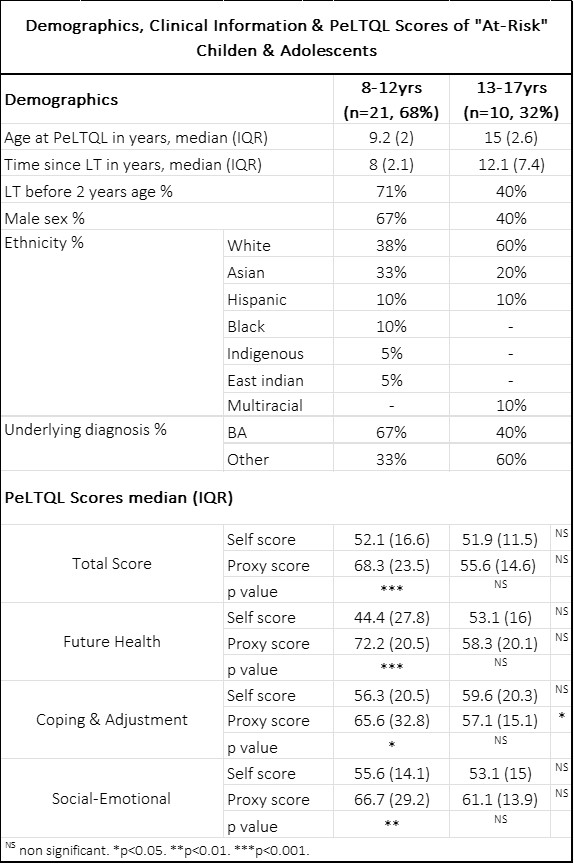Unveiling the concerns of our children: exploring overlooked worries through PROMs
Mary Flanagan1,2, Tomisin John1,2, Karen Leung1,2, Krista Van Roestel1,2, Maria De Angelis1,2, Anthony Otley3, Vicky L Ng1,2.
1Division of Gastroenterology, Hepatology and Nutrition, The Hospital for Sick Children, Toronto, ON, Canada; 2Transplant and Regenerative Medicine Centre, The Hospital for Sick Children, Toronto, ON, Canada; 3Division of Gastroenterology & Nutrition, IWK Health Centre, Halifax, NS, Canada
Background: Patient reported outcome measures (PROM) allow quantification of subjective and often unobservable outcomes experienced by patients. The PeLTQL® is a disease specific HRQOL tool validated for children aged 8-17 years who have undergone liver transplantation (LT). While self- and proxy-reported data exists, findings remain unreported. Our aim was to assess PeLTQL dyad data from routine LT clinic visits.
Methods: Data from PeLTQL dyads completed between 03/13-05/22 were reviewed. Each question is answered using a Likert scale from 1-5 (best to worst) and reversed scored to a 0–100-point scale (Likert 1= 100 to Likert 5=0). Scoring of a completed PeLTQL generates 4 scores (total score (PeLTQL-TS) and 3 subdomain scores (Future Health (FH), Coping & Adjustment (C&A) & Social-Emotional (SE)). Higher values indicate better HRQOL. PeLTQL-TS ≤ 62.5 indicates risk for anxiety (“at-risk”).
Results: We reviewed 139 PeLTQL dyads. Self-reported PeLTQL-TS was <62.5 in 22% patients, with over 2/3 of these “at risk” patients <13 years. Table 1 provides demographics, clinical information and PeLTQL scores. Younger children’s self-reported scores were consistently lower than proxy versions especially in the FH subdomain. Nine (43%) of these 21 pre-teens worried about hurting their LT- the lowest scoring PeLTQL-FH question, despite 5 (55%) having normal liver transaminases on the day of PeLTQL completion, and only 2 (22%) having had recent LT rejection.
Conclusion: Review of PROM data obtained during ambulatory LT clinic visits revealed a considerable proportion of medically stable children who express high levels of concern related to the LT. Identifying children’s concerns allows for targeted education and intervention by the pediatric LT care team.

If you have any questions during the meeting, please go to the registration desk. Our emails will be monitored sporadically.
REGISTRATION DESK OPENING TIMES
Sunday, October 15, 16:00-18:00 Monday, October 16, 07:00-18:00 Tuesday October 17, 07:00-12:30